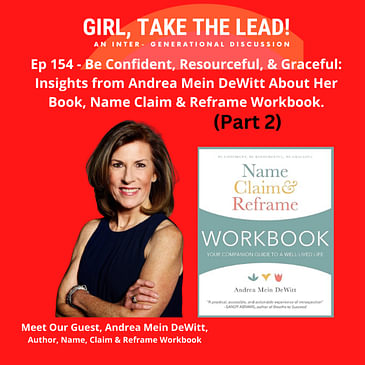Today we conclude our conversation with our returning guest, Andrea Mein DeWitt, and we’ll continue to discuss her new workbook, Name Claim & Reframe Workbook, Your Companion Guide to A Well-Lived Life, which you can preorder now and will launch April 30.
In this episode we’ll also get into reframing feedback, accepting a compliment, flying helicopters into stormy weather, and end with some healing words.
Her workbook is the perfect companion to her ‘Name Claim & Reframe’ book which we’ve covered on a previous episode.
I had the opportunity to receive an advance copy and wrote the following book jacket endorsement:
“Andrea provides a gentle path to examining the origin of our core wound beliefs and limited thinking on a deeper level so we can let go of people pleasing and quiet even the loudest inner critic. Her step-by-step process is a masterful blend of transformative insights and practical exercised designed to awaken an inner power that is both empowering and impactful. Can I get an Amen to that?!”
Here are 3 Episode Takeaways from the Series:
1. The 9 Core Wound Beliefs can help us outline our negative core beliefs and the personality we develop to compensate for those.
2. The people pleasing inner critic is rooted in fear and is
focused on earning love.
3. We should remember what Andrea’s mom had to say about accepting a complement: “When someone is giving you a compliment, NEVER interrupt.”
As mentioned in the episode:
Andrea’s Workbook, Name Claim & Reframe Workbook
Andrea’s Book: Name, Claim, & Reframe
Ep. 72, Andrea Mein DeWitt, Name Claim & Reframe (NCR) author, returns and relates her book Name Claim Reframe to female bullying
Ep. 48, A Discussion with Andrea DeWitt about her book, ‘Name, Claim, & Reframe’
You can get a free copy of the masculine and feminine trait grid mentioned in the episode here: Website: www.andreadewittadvisors.com – just sign up for the free tool kit. If you have the book, check out page 24.
Event Coming Up:
Andrea has an upcoming NCR Salon on THURSDAY, MAY 16TH
Using Name, Claim and Reframe to Heal Past Conflict
Zoom 2:00pm Eastern (11:00pm Pacific)
$97.00
Program description:
What if you could heal past relationships with refreshed vision?
Use to use NCR tools to understand past conflicts so you can REFRAME a negative experience with new perspectives and a refreshed vision for the person you are becoming. You’ll learn tools so proactively processing a regret within the structure of Name, Claim and Reframe® and harvesting learning, insights and maybe even some intentional strategy for the future you hope to create.
Link to Fall 2024 NCR Theme Programs-Starting September 5
More about Andrea:
Andreas holds a M.Ed. in Reading Leadership from UC Berkeley and is a Certified Professional Coach through the International Coaching Federation and the Co-Active Training Institute. She lives in the San Francisco Bay Area.
Ways to reach Andrea:
Andrea Mein DeWitt, M.Ed., CPCC, ACC
Life and Leadership Coaching | DeWitt Advisors
www.andreadewittadvisors.com
| andrea@dewittadvisors.com
Learn more about her BOOK
Watch her WEBINAR Read her BLOG Follow her on Instagram
Ways to reach Yo:
Website: https://www.girltaketheleadpod.com
Public FB group: Girl, Take the Lead! https://www.facebook.com/groups/272025931481748/?ref=share
IG: https://www.instagram.com/yocanny
LinkedIn: https://www.linkedin.com/in/yocanny/
YouTube: @girltakethelead





